Thoughts on Cambodia
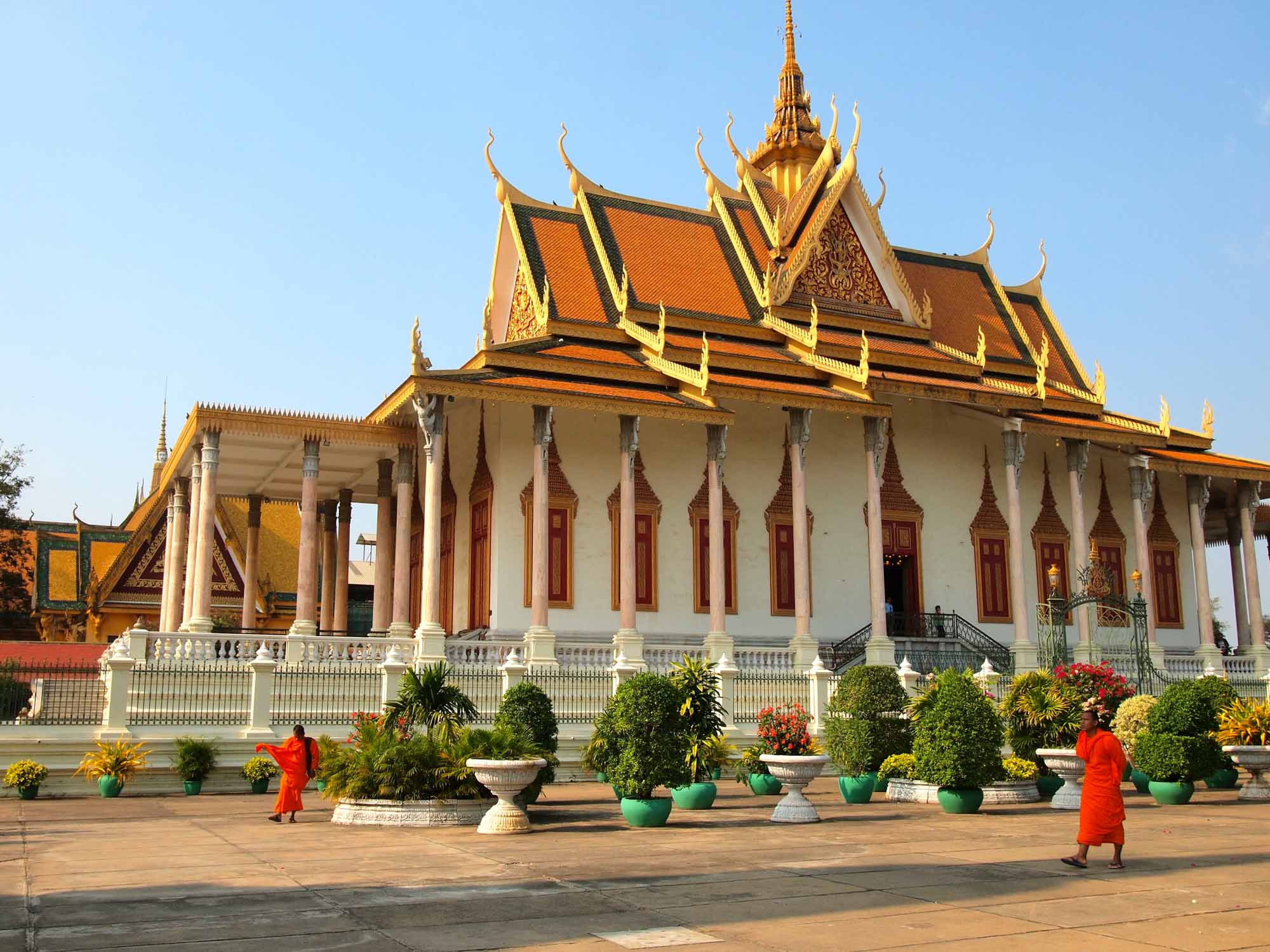
When I came home from Southeast Asia, everyone wanted to know what I thought about it. And it was mostly easy to tell them: Hong Kong was crowded and very tall; Vietnam was beautiful in every sense of the word: Thailand was tropical and relaxing.
But then I would get to Cambodia, and describing my experience there wasn't so easy.
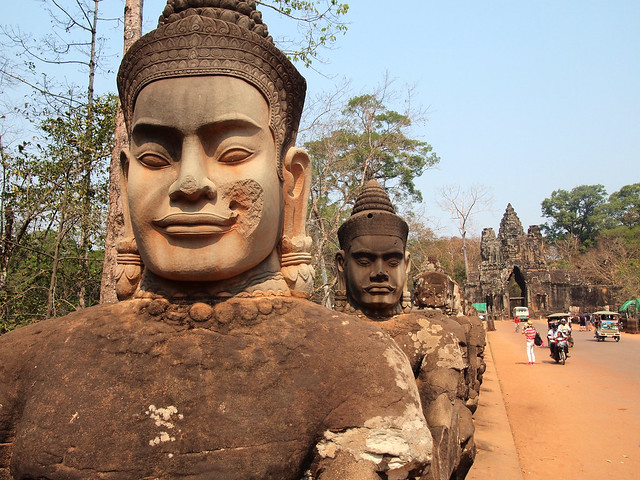
It's not that I disliked Cambodia; far from it. I loved exploring the Angkor temples, had fun riding the bamboo train, and was even amused by watching people eating spiders. But I was also deeply saddened by visiting the Killing Fields, and disturbed to see how much the country struggles with corruption and poverty.
Cambodia is poorer, less developed, and in general in more trouble than almost any other nation in Southeast Asia. And, because of this, I was really conflicted about my time there.
“It will break your heart”
I've been reading up a bit on Cambodia and its history recently, in hopes of being able to better wrap my head around it. Throughout my reading, I've come across a quote from a former U.S. Ambassador to Cambodia more than once. The quote goes:
Be careful because Cambodia is the most dangerous country you will ever visit. You will fall in love with it and eventually it will break your heart.
And he was absolutely right.
Seeing stark economic disparity broke my heart. The Royal Palace in Phnom Penh, for example, is immaculately well manicured, with buildings covered in gold and filled with valuables. But then you walk out into the city, where there is trash all over the streets and people living in extreme poverty.
According to the United Nations' Human Development Index, Cambodia only ranks #146 out of 195, with 46% of people living on less than $3 per day.
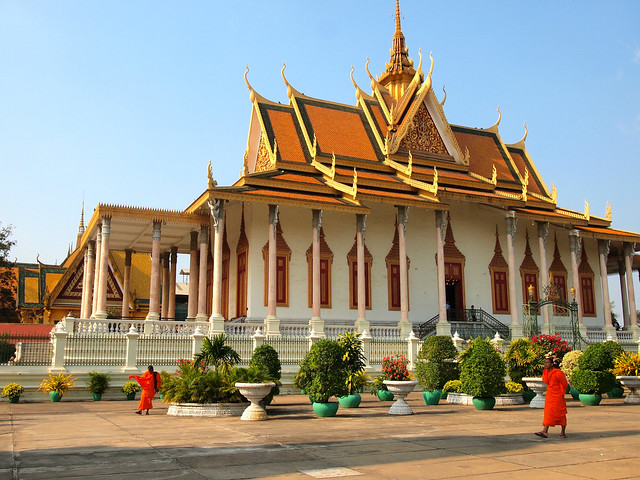
Driving through garbage-riddled villages on unpaved, pothole-filled roads broke my heart. Neighboring countries like Vietnam and Thailand are also increasing in popularity among tourists, but development there seems to be keeping apace, with decent roads and modern amenities found all over.
Cambodia, meanwhile, is lagging far behind, with a struggling economy, issues with hunger, and a lack of education.
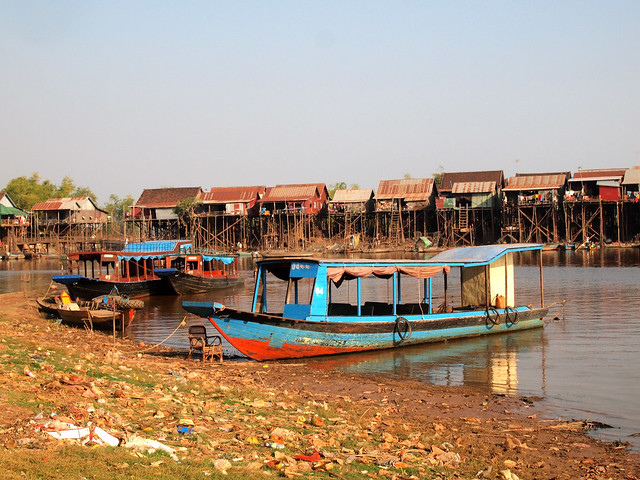
Learning about the corruption in Cambodia broke my heart. I paid $20 to enter the country, and another $40 to get a 3-day pass to the Angkor temples. That amount right there is more than most Cambodians make in a month — no small sum.
So where does that money go? Well, the border fee no doubt goes right into someone's pocket (and it's not uncommon for border guards to intimidate even MORE money out of tourists). According to the Corruption Perceptions Index from 2017, Cambodia ranks in the top 20 most corrupt nations in the world, and it's painfully evident if you look for it.
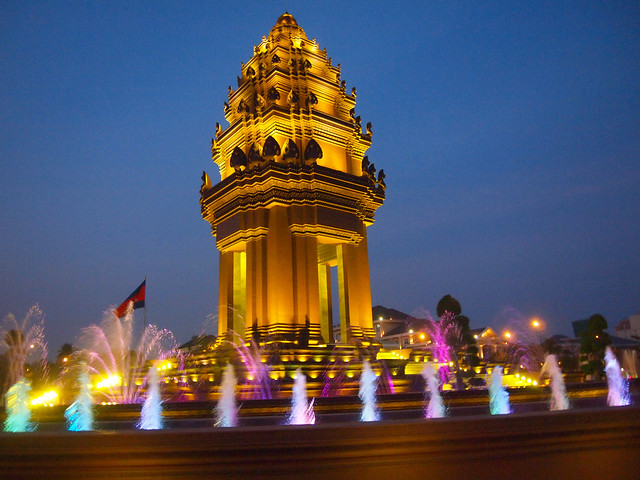
And there are plenty more heartbreaking examples: kids begging on the streets (many of whom do this “professionally” instead of going to school); touts pestering tourists inside religious sites; locals — including tour guides — throwing rubbish on the ground.
Add to this rampant exploitation of the poor and the weak (Cambodia has one of the worst reputations in the world when it comes to child sex trafficking) and it's beyond heartbreaking.
Cambodia has a lot to offer, but if you open up your eyes to the reality playing out in this country, I'll bet it would break your heart, too.
A Cambodia history lesson
To understand part of Cambodia's current plight, you really must visit sites like the Killing Fields and talk to the people who survived the Khmer Rouge era. In the 1970s, the brutal Khmer Rouge regime ruled Cambodia with an iron fist, killing millions of educated people and sending the rest to collective farms and labor camps — where millions more died of starvation and disease.
The Khmer Rouge years — still remembered vividly by anyone in Cambodia over the age of 40 — took a severe toll on Cambodia and have undoubtedly affected every person living in the country today.
After the genocide in the '70s — which strapped many Cambodians with severe cases of post-truamatic stress disorder (PTSD) that studies have suggested is now being passed on to their children — the country was divided.
The Soviet-backed Vietnamese were running a puppet government from Phnom Penh, while the Chinese still supported the Khmer Rouge armies hiding out in the jungle. The U.S. was largely trying to stay out of the mess after the whole debacle in Vietnam (which also included bombing parts of southern Cambodia to bits, too). Meanwhile, the average Cambodian continued to suffer.
After the fall of the Soviet Union (and once the genocide could no longer be ignored), the United Nations actually stepped in and tried to run Cambodia from 1992-93 in attempts to make up for the decades the West spent ignoring what was going on there.
This was the first (and only) time the UN ever did anything like this. Afterwards, the country was supposed to become a prospering democracy.
But that didn't happen.
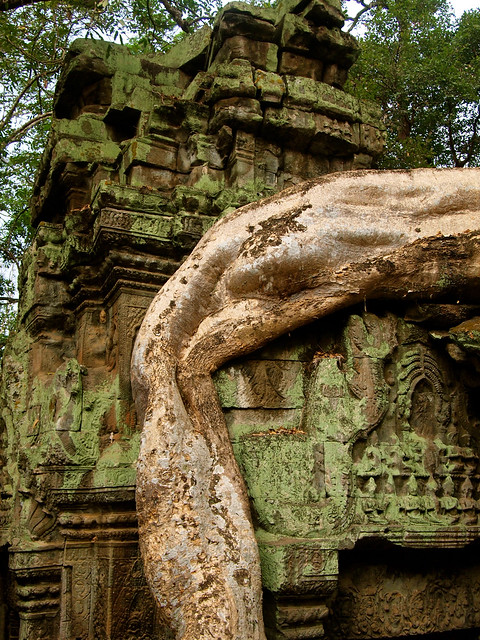
The UN didn't have the money, the troops, or the influence to really affect any real change in Cambodia. Yes, the organization pumped $3 billion into the country and WAS successful in setting up elections in which 90% of eligible voters participated.
But, after the election, things went right back to the way they had always been, with different political leaders vying for control as if the people had never spoken at all.
One of the at-odds leaders was Hun Sen, the communist leader who had been appointed to run the country when Vietnam liberated it from the Khmer Rouge. After the UN elections, Hun Sen helped “run” Cambodia in a semi-coalition government with the royalist party until 1997, when his army led a small coup and took control of the country back.
Hun Sen has ruled the pseudo-democracy ever since, but with frequent reports of rigged elections.
Some argue that the cycle of corruption and human rights failures is just intrinsic to Cambodia as a nation. Dating back to the ancient Khmer Empire (800s-1400s AD), officials and kings were lining their pockets and getting rich while the poor remained poor and slave labor was the way to get things done.
One author suggests that Cambodian culture on the whole lacks a drive to succeed, and that this, coupled with the Theravada Buddhism belief that people should be pleased with the lives they have and not aspire for more, has molded Cambodians into a passive people; victims of their own shortcomings.
I'm not so sure I agree, however. Subject a people to horror and repression and poverty long enough, and of course they will accept it as the status quo. What would happen, though, I wonder, if Cambodians were more empowered, both from within their country and from without?
Recent protests by garment factory workers demanding better pay and working conditions suggest that not all Cambodians are willing to accept the lot in life they've been (perhaps unfairly) dealt. And many Cambodians I spoke with gladly shared their opinions with me about the current corrupt government and how they (along with many others) would like to get rid of it. Post-election protests in 2013 support this opinion and prove that not all Cambodians are happy to passively sit by and observe any longer.
Unfortunately, however, as long as the Prime Minister wields absolute power, it's unlikely that anything will change.
So what does this mean for tourism in Cambodia?
As I mentioned above, Southeast Asia is emerging as a popular tourist destination. Nearby countries like Thailand and Vietnam are enjoying the economic boost that tourism provides, and Cambodia, being placed in between the two, is also seeing an influx of visitors.
In fact, tourism is Cambodia's fastest-growing industry.
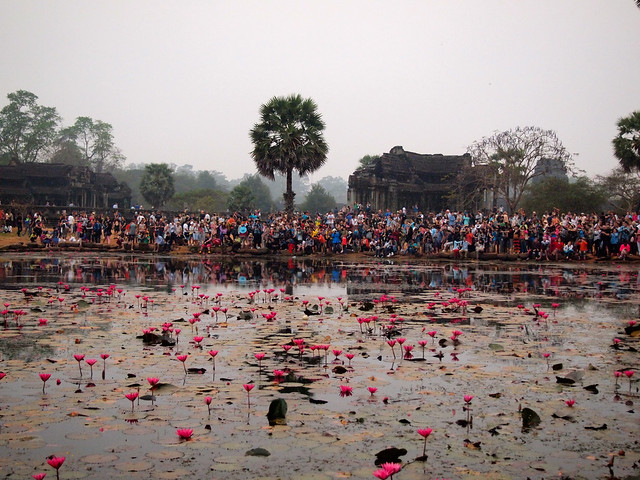
But in Cambodia, development is outpacing infrastructure. The country is so desperate to catch up that people are ignoring how completely ill equipped Cambodia is to deal with such an increase in tourists.
The people have not been educated enough about tourism development or sustainability. Things like waste management, food safety, and historic preservation are largely ignored, even in areas that are seeing lots of tourists.
For example, more and more people (millions of them) visit the Angkor temples each year, but the infrastructure in Siem Reap — not to mention the preservation of the temples themselves — remains quite basic.
I enjoyed my time in Siem Reap, but it's actually sad to imagine what the city and temples will look like 10 or 20 years from now due to over-visitation and unsustainable development.
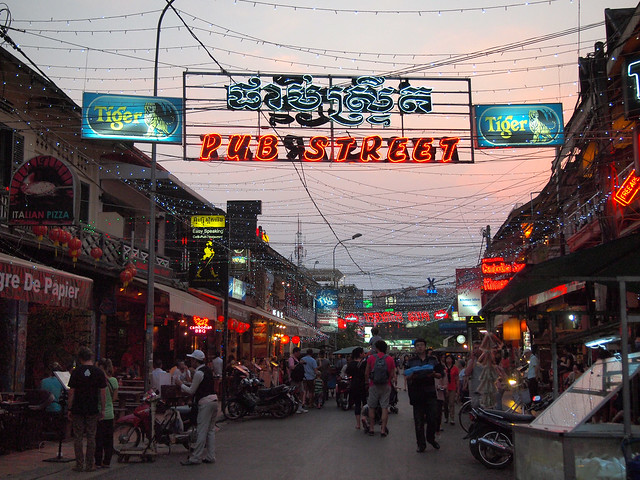
And then there's the crime. In places like Phnom Penh, you are advised to always hold tight to your bag, and NEVER have things like iPhones or iPads out in your hands when you are walking around or riding in a tuk-tuk. Even the drivers will warn you about this. Tourists, unfortunately, are becoming easy targets here.
I will not tell you to avoid Cambodia because of any of this, though. There's a reason so many people fall in love with it, after all. But this should all be food for thought.
What can we do?
Ask Cambodians how their nation can be improved, and they will say that Western powers need to step in, get rid of Hun Sen's corrupt government, and help them develop the country and economy.
Easier said than done, of course, especially if we look at recent history. Historically speaking, Cambodia has been quite averse to help that doesn’t also line the pockets of officials. The UN couldn’t affect any lasting change, and the thousands of NGOs operating in the country have not yet helped the people get rid of a government they no longer (and really never did) support.
Nations from around the world have been pumping billions of aid dollars into Cambodia for decades, and yet people outside of the cities live and work exactly as they would have done 300 years ago.
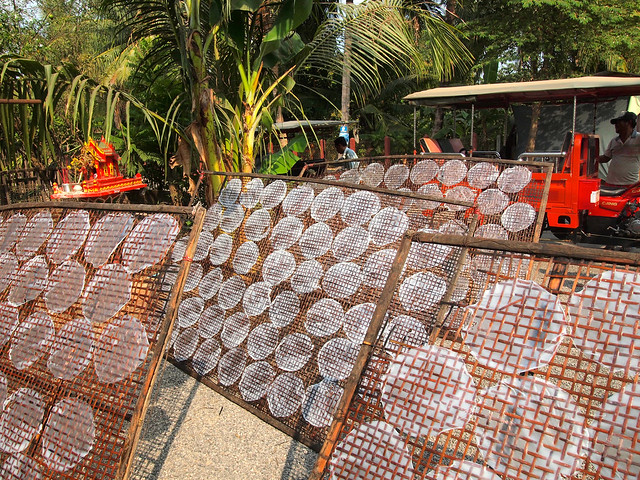
Some may say that volunteering (or, God forbid, starting up yet another non-profit) is the way to truly help in Cambodia. But I would be very reluctant to suggest this route.
Many volunteering schemes in Cambodia are scams — many orphanages, for example, exist purely as tourist attractions, and parents actually SEND their children there to make money. Pumping money into Cambodia, in some cases, could actually do more harm than good.
In my opinion, the only way to help Cambodia as a tourist is to be conscious of your decisions while there, and to be aware of how your presence is affecting the country.
Be a “good” tourist” in Cambodia
Small gestures — like going to a local restaurant that helps street kids or shopping somewhere that employs people with disabilities — can go a long way. Here are some things to keep in mind:
BEGGARS
Whatever you do, don't give money to child beggars you see on the street. These kids are purposefully kept out of school to try to sell you postcards and bracelets. They may be cute. They may be charming. But I promise that none of that money is actually going to help them go to school. They are employed (or enslaved) by someone, and they will see none of your money at the end of the day.
It's often harder to ignore beggars who are missing limbs — many of them were innocent victims of land mines that the U.S. left behind during its war with Vietnam, or of the acts of the Khmer Rouge. However, many of them ARE offered help and even artificial limbs by local NGOs. But many of them realize that they can make more money by begging on the street than working a regular job.
Whether you give them anything is of course up to you, but just keep in mind that people with any sort of disability — be it one they were born with, or one they have acquired — should be treated the same as everyone else.
Instead of giving people money, offer to buy them a meal. It's the easiest way to sort out who is truly in need from those just trying to play to your sympathies.
And, if you really want to support disadvantaged kids, do some research before you go to Cambodia about local restaurants and programs that train street kids as cooks and wait staff and teach them English and business skills. Some places I personally visited included Friends in Phnom Penh, Jaan Bai in Battambang, and Genevieve's in Siem Reap.
LITTERING
Set a good example. DO NOT throw rubbish on the ground, even if you see the locals doing it.
Driving through the countryside in Cambodia especially is depressing. The poverty is difficult to see, as is all the trash and pollution. Much of it can be blamed on a simple lack of education — people who once wrapped up their food in banana leaves and then discarded them in the river haven't been properly taught that plastic doesn't work the same way.
Set a good example by at least disposing of your garbage properly.
HAGGLING
Pick your battles when it comes to haggling. I got quite angry one day in Siem Reap when I saw someone arguing over 50 cents with a tuk-tuk driver. Unless you legitimately feel that you are being ripped off, don't do this. These guys are not begging on the street corner or trying to exploit a disability or misfortune — they are trying to make a living the best way they can.
Does it really make a huge difference to YOU whether you pay $1.00 or $1.50 for a ride into the city? You can probably part with the money.
Too many times travelers in this part of the world lose sight of reality and become obsessed with spending as little money as possible. Sure, saving money feels good. Sure, haggling is expected in Asia. And sure, the locals will always quote a foreign tourist a higher rate. But that doesn't mean that it's worth getting stingy over 50 cents.
Most of all, just go to Cambodia with open eyes. Talk to the people. Try to understand what has happened there.
And then come home and tell everybody you know. Because, sad as it is, I really do believe that spreading the word about the plight of Cambodia is the only way to truly help it.
Have you been to Cambodia? What was your experience like?

Amanda Williams is the award-winning blogger behind A Dangerous Business Travel Blog. She has traveled to more than 60 countries on 6 continents from her home base in Ohio, specializing in experiential and thoughtful travel through the US, Europe, and rest of the world. Amanda only shares tips based on her personal experiences and places she's actually traveled!


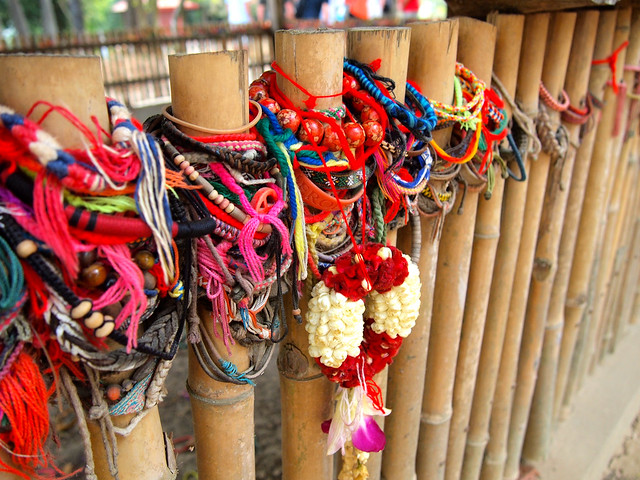
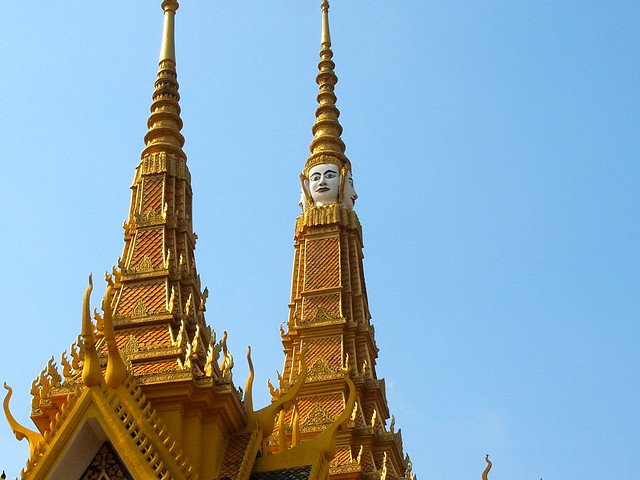
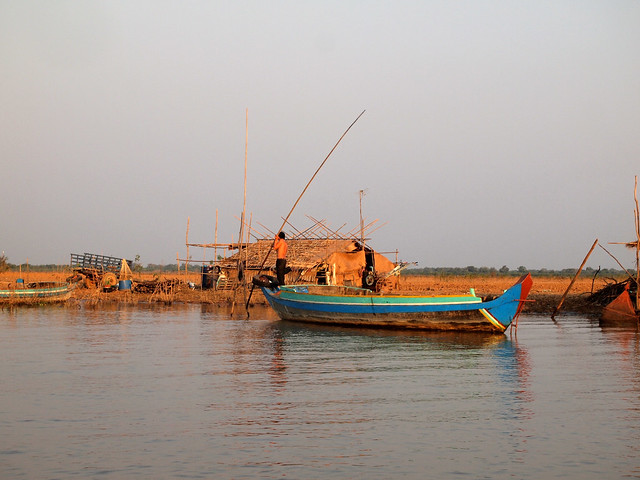

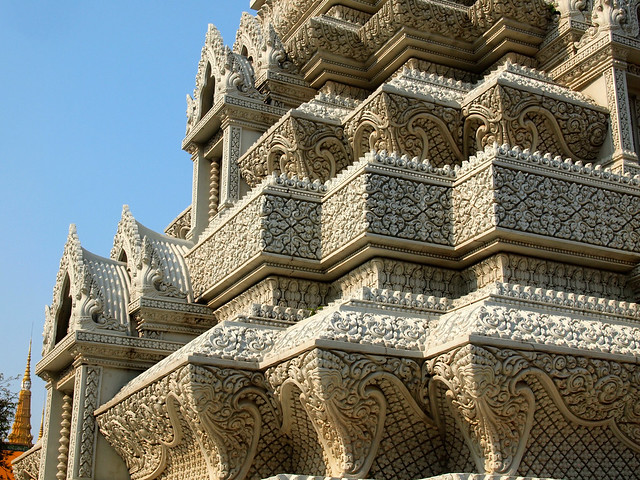
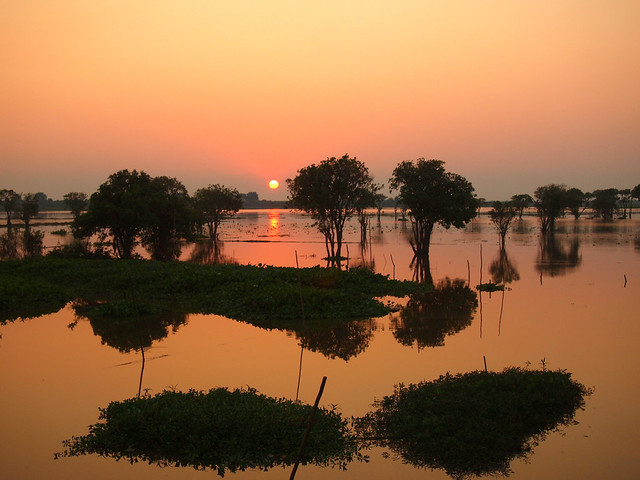









Your article on Cambodia is a poignant blend of beauty and harsh reality. It’s a stark reminder of our responsibilities as tourists and the impact we can have. Your call to action is powerful – we can all contribute to change by raising awareness. This piece is deeply impactful, and will surely resonate with many. Thanks for sharing your experiences.
I enjoyed reading your article. Having travelled and worked in this amazing country and being familiar with its history too, I think it is a very objective way to present this country. I think it will be useful to any person preparing for a trip there. I also found your article interesting as, if we had the same kind of impressions about Cambodia, our opinions vary about our experiences in Thailand and Vietnam. I saw the beauty of Vietnam for sure and the tropical charm of Thailand (and I am the first one to jump on a plane to enjoy the food there and a good massage) but I also witnessed terrible poverty, child and animal abuse, pollution and child prostitution. I am not saying the countries are the same but I personally found less contrasts between them than you did. It gave me an opportunity to reflect. Thanks.
Thank you for trying to understand and learn about Cambodia, as Khmer people, I am touching by your posted.
I’m glad there are people from other countries love my country.
My mom always told me and brother about what she’s gone through. It’s break my hearts every time I thinks about it.
We have visited Cambodia as well and left it with the feeling you describe. Good that you share these thoughts with the world. Cambodia is a beautiful country, with lovely proud people. But there is a sad history and still very much corruption.
This is a very beautiful and thoughtful post. So many people travel to different countries or destinations with little or no regard to the history or lives of the locals. Posts like these are honest and inspiring-it really helps to humanize the other side of the world. Makes people realize that they are PEOPLE too!
When people ask me about places I didn’t like or that I wouldn’t want to go back to, I’m often tempted to say Cambodia. But then I have to try to repeat this entire post in order to explain myself! It’s not that I disliked Cambodia – it’s that it was difficult for me to be a tourist there when there was so much poverty and corruption that I felt I was in some ways contributing to or supporting.
Beautiful post. Angkor is spectacular and special and continues to reward no matter how many times you visit. Despite having the eighth wonder of the world in its backyard, Cambodia’s real treasure is its people. The Khmers have been to hell and back, but thanks to their unbreakable spirit no visitor comes away without a measure of admiration and affection for the inhabitants of this enigmatic kingdom.
[…] privilege, and informational ones like this one on solo travel. Writing-wise, I’m proud of this one on Cambodia and this one about Taos Pueblo because they look a bit deeper at history and […]
This is a great article! Definitely something I will be bookmarking. I plan to spend a lot of time in Asia next year. Cambodia is on the list, but I will definitely prepare myself in the best way possible after reading this. Thank you!
Glad to hear it! It’s a beautiful part of the world, but there are definitely some things that I think it’s better to know about before you go.
[…] written about my thoughts on Cambodia before, but basically what I saw at Angkor Wat was unsustainable tourism personified. Tourism where […]
Wow. This post is very eye opening. I have been to other places in South East Asia but have not witnessed some the things that you describe here. I probably still will visit this fall but am glad I came across the post for a complete over view of the area.
I hope you still go! It’s a beautiful country, but it’s definitely been through some struggles.
Great post Amanda. I love browsing your “best of the blog” page from time to time. There are great hidden gems. I loved the quote though: Cambodia will break your heart because you will love it so much. Amazing.
Thanks! I’m glad to hear people find that page useful!
Just found your blog through your interview at Learn to Blog. This is a great post and very informative. Thank you
Thanks very much for reading, Brian!
[…] travel. This had little to do with the tour itself (I still had a great tour group) and more with the state of tourism in Cambodia in general. It’s easy, I think, to simply fly into Siem Reap, snap that iconic sunrise photo […]
I haven’t imagined Cambodia that way but after reading your article and seeing the photos I think it is a really interesting country, which is worth visiting. Thank you, it would never occur to me to go there if it wasn’t for your post! Cheers
[…] couldn’t wait to for their ten days in the country to be up. Fellow bloggers expressed mixed emotions and downright […]
[…] couldn’t wait to for their ten days in the country to be up. Fellow bloggers expressed mixed emotions and downright […]
Thank you for posting this! I came across your blog as I begin planning a trip to SEA. As I plan, I have gone back and forth as to whether or not I want to include Cambodia on my itinerary. I have heard both wonderful things and painful or scary things about experiences in Cambodia. I will probably book a tour through one of the group tour companies but I just can’t decide if Cambodia is in my near future or not… I’m a fairly inexperienced solo traveller and just don’t know if it is something I can handle yet – particularly because of the corruption and safety issues you mentioned above and other information I have read on those topics. I feel like being part of a tour group will make things easier, but maybe not necessarily in the ways that would make me feel more comfortable. Maybe Cambodia needs to stay in my more distant future for now. Thank you again for your honest review.
Hey Nicole! If this is going to be your one big trip to Southeast Asia, I would say just go for it. Unfortunately, I don’t think things will get better in Cambodia over time – in the next decade, I only see it getting worse. So I would definitely go now if you want to see places like Angkor Wat!
Booking yourself on a small group tour should definitely help you feel more comfortable. It will give you people to do things with, and a local guide who will be able to navigate through the country and help you avoid any unpleasant experiences.
[…] I read a thought provoking blog post from Amanda at A Dangerous Business. Her Thoughts on Cambodia left me sad once again for the country. She talked of Khmer Rouge history, poverty, […]
Amanda,
Terrific post 🙂 I volunteered at an NGO in Siem Reap for three months & found this post to be spot on. The NGO was vetted by my university and after my three months there, I can confirm that those running the NGO are competent, honest, efficient, and effective.
Under your heading of “What can we do?” I would add, “Volunteering for an NGO.” I understand your skepticism on donating to an NGO, but going through the due diligence and finding a legitimate one to work for can be so rewarding for both sides. I talk about this more in my posts about my experience in Cambodia:
http://lucidpractice.com/koh-ker-village-cambodia-travel-week-3/
Taking time for yourself, a gap year, traveling, all that is wonderful but your post sheds light on the fact that there are areas in this world that need our help. While going through a gap year, let’s encourage travelers to consider spending a month or two helping a community.
As you mentioned, there are thousands of NGOs in Cambodia, many of them are at best ineffective and at worst immoral — but this is not true for all NGOs! It’s important to do the appropriate research before joining an NGO but there are certainly worthy organizations doing the utmost important work.
Thank you 🙂
Thanks so much for the great comment, Daniella! I totally agree that thoroughly vetting any organization you’re planning to volunteer with is SO important. Unfortunately, many people don’t do this, which is why there are so many shady NGOs and volunteer opportunities in the developing world.
Me and a friend are currently in Vietnam, and are travelling into Cambodia tomorrow. After a quick search on Google, this popped up! This has been EXTREMELY helpful and given me a real good insight on what to expect! This is the first time I’ve really ventured out of the UK, so I Had no idea what to expect. Thankyou very much, and I’ll let you know my opinion after! 🙂
So great to hear that this helped prepare you, Craig! Definitely let me know how your experience goes.
This is such a wonderfully written article. Thank you for sharing such depth of knowledge about Cambodia. It is rare to find travellers who don’t just travel for self-gratifying purposes. Will take note of the tips you’ve provided.Your article has really moved me!
Thank you so much, Joan.
I agree with you strongly on this eye-opening post. It really breaks my heart turning down those beggars in Cambodia, but at the same time, realizing that by giving irresponsibly we could bring more harm than good by contributing to the root of the problems. Sad to hear that even the volunteering and NGOs way is not helping much. =(
Not saying that ALL the volunteers and NGOs are bad. Some definitely ARE doing good things. But the vast majority actually do more harm than good. 🙁
Really eye-opening post – thanks so much for taking the time to write it.
Thank YOU for reading!
Hi Amanda – Thanks for bringing these issues to light. I’m glad that you mentioned orphanage tourism, because it’s something that really surprised me. One of the writers on my Boomer Women Travelers website has written about this. I’ve linked to the article. Hope you will find it interesting.
Yeah, it’s a really disturbing trend! I would be very, very wary of visiting an orphanage anywhere after learning about this in Asia.
Cambodia absolutely broke my heart. It really hit me when I found myself crossing the street in order to avoid the child beggars coming at us from the other direction, and again seeing the bloated, limbless beggars at the temples.
It’s just so sad. 🙁
This is a really thought-provoking post Amanda and I like it! I like the fact that you’re not afraid to talk about the issues of importance not only about the wonderful time that you had, but also the things that worried you too.
I haven’t been to Cambodia yet as I chose to go to both Vietnam and Thailand only, the last time I was in the region was seven long years ago. Thinking about why I didn’t go to Cambodia was pretty much because it wasn’t on my radar at the time.
It is now.
Thanks so much, Victoria. I’m not one to write a lot of negative stuff on my blog – I’m usually one of those people who can find positives in nearly every destination. But in Cambodia, it was different. I felt like the “negatives” – the things that worried me and made me sad – were really important to talk about.
Thanks for the amazing words you have here. As a Cambodian myself, I’m very happy you love Cambodia while also don’t know what to say about my feeling when you say you hate it,too. Yes, I admit that my country’s still not democratic and developed compared to our neighboring countries and we try to find solutions to get rid of the corrupted government.
I appreciate that you can kind of understand where I’m coming from. I really hope your country can find the solutions it needs!
“Orkun”. I hope you and all the other travelers who had bad experiences here will soon come back to visit our better Cambodia soon.
what an excellent post on Cambodia! I find it kind of annoying when Travel bloggers go to a country that is very low on the socio-economic totem pole so to speak and then gloss over the real hardships of the country. Or only talk about the good stuff they experienced. Not only did you talk about your experiences but you also provided a brief HISTORY of the country and WHY it is the way it is now and challenged your readers to think beyond the pictures or news articles or even their own experiences.. Bravo to you! this is probably one of my favorite travel blog posts ever!
Wow, thanks so much! It’s very easy to gloss over things sometimes – I’m guilty of it, too, because I really like to look at the positive aspects of any place I visit. But it was impossible for me to ignore the reality in Cambodia. And I felt that it would be irresponsible of me to not share what I saw and learned there with my readers.
Very nice to read this article. We are struggeling to make up our mind about cambodia after our second visit last month with our 1 year old baby (first time in 2006). I seems like the country hasn’t changed to much. People are really friendly, nature is lovely and the food is great. But then there is to short sightedness, corruption, theft (some stuff got stolen) and the litter. Amazing beaches like koh rong getting ruined in front of your eyes. Happy too see we are not the only ones with mixed feelings.
No, you are definitely not alone in your feelings. A LOT of people I’ve talked to who have visited or re-visited Cambodia recently have expressed similar feelings. 🙁
Great insight and very comprehensive. Really enjoyed reading this. Thank you.
Thanks very much!
This is the best article we’ve read on Cambodia in a long time. Good job. Most travel bloggers choose to only write about how difficult their trip was without trying to understand what is happening there it how they can contribute to positive tourism. It’s good to see somebody educate themselves so much on the places they travel.
There are rich investors who want to build the larger skyscraper in the world in Pnom Penh on a street bettor unpaved slums. The gap between rich and poor is huge!
Thanks so much, Alex! I was really conflicted while I was in Cambodia, because I couldn’t tell why I wasn’t enjoying it as much as Vietnam. It took me weeks – months, even – to do a lot of reading and reflecting to figure out my feelings about Cambodia and what influenced them. I’m glad I put in the effort, though.
And I know what you mean on the HUGE gap between rich and poor. There are lots of foreign investors who want to build resorts and casinos and stuff in Cambodia, and of course the government is going to say yes to all of them, even if it’s not at all sustainable. Sad.
I knew very little about Cambodia! But this made me think of it in a completely different way. I will keep it in mind if I can visit it as planned.
I’m glad that you learned something from this post!
Spectacularly done darling. Thank you for giving people a very real view of the history of Cambodia and the problems that plague it today. As you know I’ve struggled with these same issues, and am spending some time considering what exactly we can do about it. Of course it all comes down to empowering people to help themselves. x
Thanks so much! I’ve followed all of your Cambodia posts, too, and we are definitely on the same page. And I agree that empowering Cambodians as a people is the only way that things can change. But how to do that is a whole ‘nother question!
Really thoughtful and well-written post. I felt the same way when I visited Cambodia in 2012. Not giving money to the child and disabled beggars is so hard, although you hope it is for their own good in the long run. I remember we had 2 children come up to us and ask for money while we were eating lunch in Siem Reap. We declined to give them money, but instead offered them some of the fruit off our table. They took it and devoured it hungrily on a step beside the cafe we were eating at. I felt that we had done something a lot better for them by directly benefitting them, rather than giving them money that may be taken from them by a parent or other adult. Cambodia is such a lovely country with many beautiful and giving people, it just has a long way to go still.
You definitely did the right thing giving the kids fruit instead of money! At least that way you know you helped, even if only in a small way. Small gestures like that are still important.
Such a beautiful written post, very thought provoking. In a similar vein to you not knowing how you felt about the country, I’m not sure how I feel after reading your article. It’s a great reminder to be a responsible and ethical traveller though and I’ve got a feeling your words are going to stick with me for a long time.
I hope they do stick with you, Catherine! If this post made you think, then I did my job right!
What a very thoughtful post! I’ve only been to Siem Reap so I haven’t been to the Killing Fields. Based on what I’ve read about it, I don’t think I ever will. I loved Thailand and Vietnam, but I didn’t like Cambodia. If it wasn’t for the Angkor Wat, I wouldn’t have gone there. Maybe in time, that will change.
I think the Killing Fields are definitely worth a visit, especially if you really want to understand Cambodia’s recent past.
But yeah, I know a lot of people like you who love Thailand and Vietnam, but did not enjoy Cambodia at all.
Amazing article Amanda. Well written, thought provoking stuff. I don’t normally leave comments like this, but I had to this time 🙂 Nice job!
Thanks so much, Laurence! Means a lot that you found this post good enough to comment on. 🙂
Best thing I have read in a long time Amanda. So well written, thought about and researched. I’ve only been to Siem Reap and feel like it is sheltered in a way from most of the bad in the country because it is such a massive tourist spot. I’ve learnt a lot from reading this. Thanks for sharing your thoughts.
Thank you so much, Jen. That means a lot!
I know what you mean about Siem Reap being a bit “sheltered.” I mean, there’s still poverty there, and the street-corner touts can be really in-your-face. But I felt the safest walking around on my own in Siem Reap, probably because of the very touristy feel of the city.
Great post Amanda. You are spot on with everything. Cambodia was a very difficult place for me to visit and I think about it often. I’m looking forward to returning one day to see if I feel differently the second time around.
It was really difficult for me, too, Tracey. I would probably be willing to re-visit Cambodia someday, but I have a feeling it would just break my heart all over again.
Hey Amanda,
We were in Siem Reap and PP just a couple of months back and reading your post stirs up a lot of emotions. We couldn’t have said this better. Completely agree with whatever you have listed, but that said, it’s a sad truth that corruption is rampant and even though tourists shell out quite a lot of money, you don’t see much development. The same can be said about India. For that matter, Vietnam too – Saigon was cleaner than Siem Reap, but you could still feel the poverty and the corruption. I think it’s bound to happen in developing countries with surging populations.
Love your advice – go their with an open mind and talk to the people. That’s one thing we always tell our audience too – that’s the best way to experience a new country.
We thoroughly enjoyed Siem Reap beyond the Angkor temples too – which one did you prefer? Siem Reap or PP ?
Cheers
I agree that these issues are likely to plague any developing country with a surging population and a (new) focus on tourism. I saw much more development in Vietnam than in Cambodia, however, even though the countries have similar histories that have intertwined quite a lot.
Glad you agree with the tips I gave. They aren’t much, but if everyone followed them it might just help a bit.
As for which city I preferred… Phnom Penh felt more “real,” while I found Siem Reap to be more touristy. However, I felt much safer wandering around on my own in Siem Reap, perhaps because of that touristy focus. (It also may have helped that I was a woman; I didn’t get any offers for drugs or hookers from dudes standing on street corners…)
Amazing post Amanda. I was just recently in Cambodia, staying mainly in Siem Reap, and the night I arrived I already wanted to leave. Not that I will not ever return, but I had heard so many great things from people on tours and such, and then when I arrived I was smacked in the face with the reality. Every step I took while walking through town was followed by a “Tuk yuk sir! Cocaine? Marijuana? Boom boom?” and after I’d pass them, another would be in my face. And then the small children with rotting teeth carrying babies and swarming me pleading. And most every driver or person I met along the way demanding tips before they even did anything. Many other things. It was just really in your face and a terrible first impression and I was exhausted from getting there — so all those elements made me want to pull my hair out and run away. I don’t doubt the people of the country are warm hearted and they have suffered so very much, and struggle to survive. And I hear so much about what the country has to offer as well, but I will have to go back another time in the right (prepared) mindset for the barrage of emotion and intensity.
I can imagine Siem Reap being a shock to the system if that was your introduction to Cambodia! I promise that there are other parts of the country that are a little less in-your-face – though no less heartbreaking.
You’ve written a very good, thoughtful post. It reminds us of the predicament we encountered when visiting Burma (Myanmar) several years ago before it opened up to tourism. Should we go? Or should we boycott the country because of its political situation? In the end, we went. But we spent a lot of time talking with the local people to learn about the country, who told us they were glad we had visited. We were also advised to not give money to any begging children, but to donate directly to the local Buddhist nunnery (which we visited) – the nuns operated a school for children. We ultimately hoped that in some small way we benefitted the local people (though recognizing that some money no doubt went to the military regime too).
It’s really good that you were conscious of your actions in Burma. Its situation is even worse than Cambodia’s, but that definitely doesn’t mean that people shouldn’t travel there. They just need to travel smart and aware in Burma, and it sounds like you did that.
Amanda, this is an incredibly well thought out, insightful and informative post. I know it was not easy to write and Cambodia has been a hot topic lately. I have spent time traveling through the country and seen things that broke my heart. I have traveled to small villages in the country and seen poverty that made my cry. Puppies tied to stilts supporting bamboo huts that would be dinner. Babies and children covered in dirt and snot, but still with smiles on their faces. Entire villages pushed aside and land slashed and burned to make way for military, for government and new “villages” constructed to move people to when kicked off of their land. I’ve seen bribes (to the tune of $2 during an elephant rescue I was on), I’ve seen an interior of the country burning, highways made of dirt, corruption … but I have also seen beauty and love and happiness. Cambodia is one of those places where you can’t let that initial impression be the one that settles in your heart. You have to give it time, explore, embrace, learn and learn some more. There are stories in the sadness, stories in the corruption … I wish more people would take the time to learn about the country like you did and then share their thoughts on it. Thank you for helping to open peoples hearts and minds to this country.
Like many developing nations, I found Cambodia to be really complex. I, too, saw the smiling dirty kids and the little glimpses of beauty in the simplicity here and there. I wouldn’t say that I fell in love with Cambodia, but I did my best to open my eyes and mind to it. And this was the result. So glad you liked the post!
All one can do sometimes is to simply affect change through their actions, and to spread the word about it – that is what you did here. Thanks for that, as there are not enough engaged people these days!
I completely agree, Meghan. Sometimes small actions are the best we can do – but we should definitely do them.
Thought provoking article.
Keep travelling with voice.
Thanks very much. And you bet!
Great post! I am heading to Asia next year for a 6 month trip and I hadn’t planned on visiting Cambodia but you may have just changed my mind! It sounds like a very interesting place with a tragic history. Thanks for the advice 🙂
Awesome to hear that this post has intrigued you! I was afraid that it might actually scare some people away from Cambodia. You should definitely add it to your Asia itinerary if you can!
Interesting and important–I like that you look at reasons and offer some suggestions. I have not been there but have had Cambodian students who were some of the nicest people to have ever been in my classes (and that’s saying a lot because many of my students are just sweeties). One of them was a journalist in Cambodia and fled as a political refugee. The last I heard about him was from his wife, who told me that he he was suffering from a delayed result from Agent Orange exposure. So sad.
Many travelers who have been to Cambodia will tell you about the people there – I think the travelers who fall in love with Cambodia really fall in love with the people! But yeah, it’s sad what so many of them have been through…
Wow, this is such a thoughtful post. I think you eloquently explained the current state of their tourism and politics without being judgmental while still encouraging people to visit. Beggars, poverty and corruption are often things we encounter when traveling and don’t really know how to process them. Everything is so different from our usual world. Thank you for this. Great job!
This was not an easy one to write. On the one hand, I really wanted to write an honest post. But, on the other, I didn’t want to make it seem like I was telling people to skip Cambodia. I’m glad I was successful!
This is a great article. I’ve never been to Cambodia but I know a bit of their history. I didn’t know much of their current state; it’s quite sad. Thanks for showing all sides of this country. I agree about picking your spots for haggling; is it worth it for a few cents or dollars? Very heartbreaking country.
Very heartbreaking indeed. But I think it’s important, as a traveler, to acknowledge this side of things, too.
Amazing post. And a little eye-opening. I’m planning on visiting Cambodia for a month next year and have read numerous posts about the country and travelling through it, but this has been the best so far! I hope I do go in with an open mind, but I’m sure as you say, it will break my heart too! I want to see the real Cambodia, and I truly hope that doesn’t mean I’ll have a ‘bad’ experience as many have said they have done. But I know many have fallen in love with the country and the people as well!
I’ve definitely heard people talk of good AND bad experiences in Cambodia. I think if you go in with an open mind, and with a little background knowledge on the country, you will indeed see the “real” Cambodia.
Thanks so much for the compliments on this post!
I was hanging on every word in this post, Amanda. Cambodia is one of my favorite countries in the world and I’ve spent about five weeks there in total over two different trips. Both times I left on a high… it just makes me heart happy to be there.
However, I’ve been hearing from several friends and acquaintances lately that they didn’t have such a positive experience and I’ve been so curious as to why. I think you verbalized it so well here. It sounds like the experience I had in Vietnam, you had in Cambodia, and vice versa.
And wow, what a powerful quote from the former ambassador.
Yes, I’ve heard the same from a lot of people who have been there recently – I almost didn’t go to Cambodia at all because of all the negative things I was hearing. I’m really glad I DID go – but at times it wasn’t an easy place for me to be.
Thanks so much for reading, Alex!
We plan to visit later this year, so thanks for all of this info. Long ago I lived in Tijuana Mexico and it was a similar thing there as well. Sad, but help where you can and in a smart way.
Helping in a smart way is the most important part, I think!
What an eye-opening read, Amanda. I don’t know much about Cambodia but this is certainly good food for thought. It’s sad to think that 10 or 20 years from now the country might be in the same exact situation it’s in today because of a lack in education and semi-dishonest government officials.
It’s REALLY sad. In fact, if things continue as they are, I wouldn’t be surprised if things got much worse in the next decade or so.
A very interesting post, well done Amanda!
I had always asked myself about the littering in the streets that I saw in documentaries, and you give a perfect explanation: we are taught, in schools and through campaigns, about recycling and the protection of the environment, it’s not a thought that comes naturally.
I agree about not buying anything from children, and about not arguing over small amounts of money. The only thing I don’t agree with is foreign countries actively stepping in in these cases. I think it’s always better if a country slowly makes progress towards the better on its own, without the forceful intervention of other countries. What we can do is raise consciousness among Cambodians that a better life is possible. I’m from Italy, and even though there is much corruption in my country, I would hate it the United States or Germany stepped in and said what’s best for the country, getting rid of this or that without people changing their attitudes towards power or choosing better leaders.
I totally understand that stance on not wanting other countries to step in. The problem in Cambodia is that other countries have ALWAYS stepped in. China backed the Khmer Rouge; Vietnam chased out the Khmer Rouge; the UN tried to reorganize the country. After the UN experiment, Cambodia was being funded by mostly Western countries, to the tune of billions of dollars. Now, Cambodians feel that intervention from an outside power is the only way to change things once again.
I’m not sure where I actually stand on that topic. On the one hand, I agree with you that Cambodians should be empowered enough to want to change their country on our own. But, with such a powerfully corrupt government, I think that would actually be nearly impossible for them to do unaided. It’s such a tricky (and touchy) subject!
This is a timely post for me, as I just arrived in Siem Reap this afternoon and already agree. It’s pretty intense here, like I have to be on my toes at all times. I didn’t experience that in Thailand at all.
Corruption, poverty, child workers, etc. plague most Southeast Asian countries. But I definitely saw it the worst in Cambodia. I really hope you still manage to enjoy your time there, though!
This is such a well-rounded and accurate post. I really enjoyed reading it. I had one of my best friends living in Cambodia while I was visiting and it was so different to see PP from a local´s perspective. (After almost a year she decided she didn´t want to live there anymore and I can see why. It´s so corrupt!). Still, I loved it, but I wonder what I would have thought about it if I visited on my own. I think I would have felt a lot more unsafe and weary of people. Also, there are also so many heartbreaking sights in the country as a whole, it is such a trip of ups and downs!
Ups and downs is definitely the way to describe Cambodia! I was actually on a tour in Cambodia, and having a local guide (from Battambang, though he now lives in Siem Reap) really helped me experience it a little “deeper,” I think.
I love your thoughts on cambodia and that you went a little deeper then a lot of people do when touring a place. I agree, I think volunteering is often a hoax and people get warm fuzzies from doing it but it rarely does as much as we like to think. I do think the country sounds intruiging though and would like to go
Thanks, Rebekah. I totally agree with you on volunteering. I volunteered at an elephant sanctuary in Thailand on this same trip. And, while I had an amazing time and learned a lot about the plight of the Asian elephant, I know that the money I paid to volunteer was actually the part that helped the park the most, not necessarily the time I spent there. Still glad I did it, though! But, knowing this, I would definitely be wary about volunteering for any organization where my money might go into someone’s pocket.
Glad that you still want to visit Cambodia, though! I was worried that this post might turn some people off.
This is a really eye-opening and insightful post Amanda, thank you for sharing. I am heading to Cambodia as part of my travels around Asia this summer and similar to others, have heard very different tales about the country.
As I set off on my long term travels in 2 months from now, I have been considering more and more how I could work or help in certain countries and whether I would be doing more harm than good.
I really appreciate the post and I will definitely investigate some of the organisations that you mentioned above 🙂
I’m really glad you found the post useful, Lisa.
It’s tough in this part of the world, because you often want to do something to help when you see the poverty and exploitation. But I would definitely counsel you to be careful, especially if you’re considering a volunteer project that involves people. “Voluntourism” is becoming so popular in many parts of the world, but it’s not actually always the best way to spend your time (or money).
Thanks for this post. All too often we only hear about the amazing sights and the great times people have. Sometimes people are afraid to criticise the countries that they visit (myself included) but it often needs to be said.
I don’t view this post as a criticism – I just view it as essential education if you’re going to Cambodia! But yes, I agree that writers too often only focuses on the good parts and ignore all the rest.
Wonderful post, Amanda, and one I feel I could have written myself as it so closely mirrors my own feelings about Cambodia. I am deeply deeply ambivalent about the place—I had some wonderful times there, but things like the corruption and greed really took their toll on me as well. I have never seen so many Lexus SUVs in an Asian country, never mind one where the average salary is $1.25. It was just astounding. Cambodia is definitely one of those places that I’m glad I visited, but it’s also one of the few places we’ve been where I’m not really eager to return.
It’s like you took the words right out of my mouth, Steph. I both loved and hated Cambodia. And, while I’m glad I went, I don’t know that I would want to go back – especially if things just get worse.
Hi Amanda,
This is one of the reasons I love your blog the most. Most bloggers who visit Cambodia would just write about their experiences through rose-tinted glasses, about how beautiful and dreamy the Angkor Temples are and leave it at that. But you take it further and educate your readers about the other side as well, the not so ideallic bits. Your post on the Concentration camps, or being an American in Vietnam, and now this one, are some of my favourites. Thank you for this 🙂
Thank YOU so much for this comment. These posts are always the hardest to write – probably because they are always quite personal – and I’m always glad to hear when people really connect with them. I also really appreciate that you take note of the fact that not all of my posts are rosy. A lot of them ARE, to be fair, but I try to write about the real realities of the world every once in a while, too.
This is a really powerful post, Amanda. I’ve never been to Cambodia, but have heard a lot of conflicting things about it recently, similar to the sentiments that you echo here. Adventurous Kate wrote a great post a little while back about how Cambodia has changed (for the worse) in the past few years, which was also an interesting read. Hopefully the Cambodian people will be able to affect change themselves, but that’s probably easier said than done and, like you say, the international community, even visitors to the country, can do a lot to help, like being aware of where they are and the issues that drive things like corruption or dependence on begging.
Thanks so much, Tom. I remember Kate’s post that you mentioned – I read it not long before my own trip to Cambodia. And, while I try to not let things other people say color a country for me, I can totally understand how she came to those conclusions after having seen the country and situation for myself.
I think that travelers like us are really the best defense Cambodia has at this point – we HAVE to educate ourselves and spread the word.
Wow what a powerful post Amanda. Excellent. I spent three weeks in Cambodia – two weeks on an Intrepid tour and a week on my own in Kep and Phnom Penh. I knew this was going to be a country that would break my heart when the man beside me on the plane from Singapore to Cambodia told me how his entire family (with the exception of an uncle and his family who he was on his way to see – he now lives in the U.S) were murdered by the Khmer Rouge.(his father was the principal of the school that is now Tuol Sleng) I understand so many of the points you bring up. Not having been to Vietnam (YET) and with my last trip to Thailand being in 1990 (WAY overdue for a return trip) I can’t really compare it to any other country in SE Asia. Of course the history is absolutely heartbreaking and it will affect the country for generations. While visiting a fishing village just outside of Phnom Penh (on the freebie Urban Adventure I got through you!) I came face to face with extreme poverty and literally walked on garbage as there was no avoiding it .I couldn’t help but think why can’t they even try cleaning this up but then I chastised myself for thinking like that – they are too busy trying to make a living to worry about their surroundings. Yet wouldn’t it make life a bit easier not to have to worry about your child cutting themselves on broken glass? I tipped generously whether it was tourist guides or the masseuse. I have so much compared to the citizens of Cambodia – why can’t I share? I don’t “get” people who haggle for 50 cents. I tried to support the NGO’s and restaurants that support locals but I know it is like a drop in the bucket. IF they do get anything. As you say a very corrupt country and the future does not look too promising. Yet I hope to return one day and dare I hope it will be be a bit better?
I hope you do return someday, Laurie. And I hope that the country is better off then than it is now!
I know very little about Cambodia but I think you did a wonderful job here in giving a brief yet informative background on the country and more importantly, your thoughts as a tourist visiting there.
A lot of what you wrote was hard to read and I am sure it is even more so experiencing first hand. I haven’t been to Southeast Asia but have traveled and lived in numerous developing nations in Latin America. The poverty in Nicaragua is so rampant (it’s one of the poorest nations in the Western Hemisphere) but will always remember someone telling me that Nicaragua compared to a place like Haiti is paradise. It’s one of those things you just can’t imagine. The quote you provided though from the ambassador is perfect in describing travel in so many places like Cambodia.
When I read posts like this they do break my heart since we will spend $10 without a second thought and for so many people that’s more than a family of four will have to live on for a week.
I can completely understand how it was hard to put to paper your thoughts and emotions.
It definitely made me think. But that’s not a bad thing – too often I think tourists visit the main sites and snap their photos and then declare their complete love or hatred for a place. But it’s much more complex than that, especially when visiting developing countries. I did my best to just observe and listen and not make any judgements in Cambodia, even though parts of it were very hard to see.
Thanks so much for the great comment.